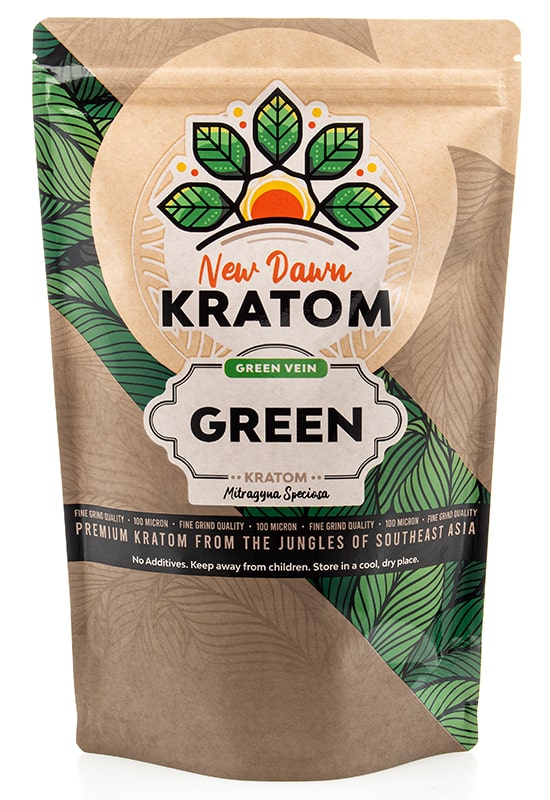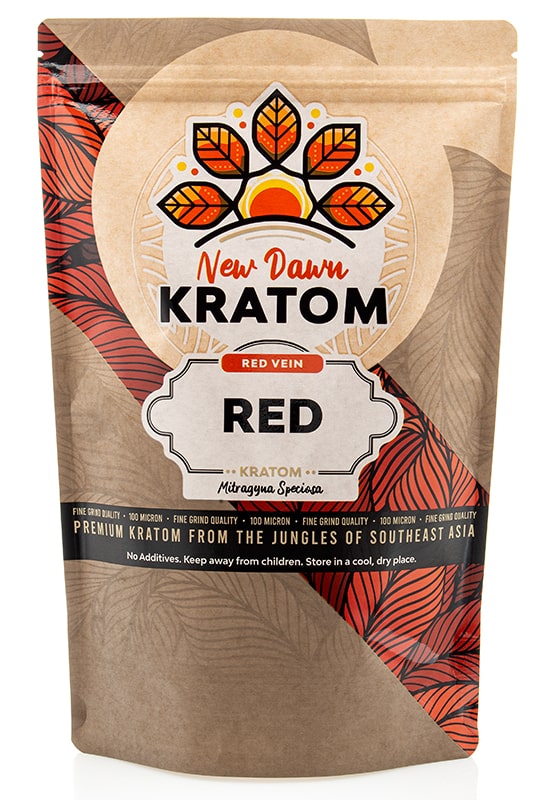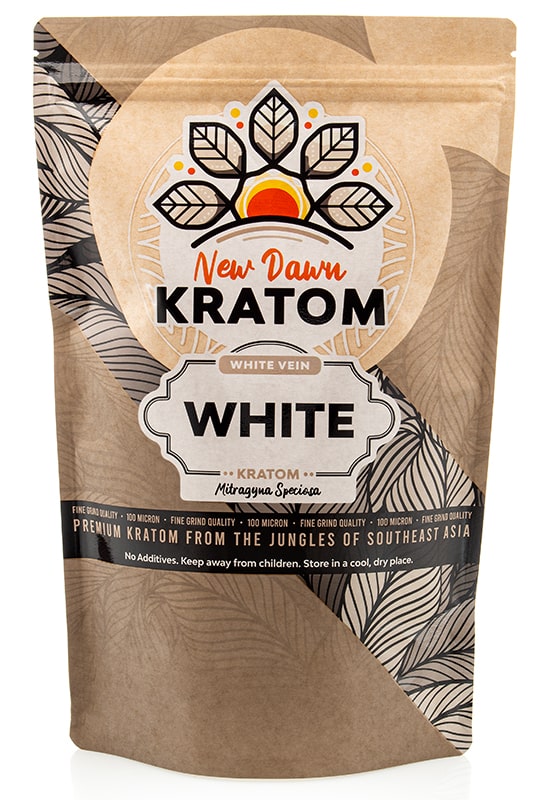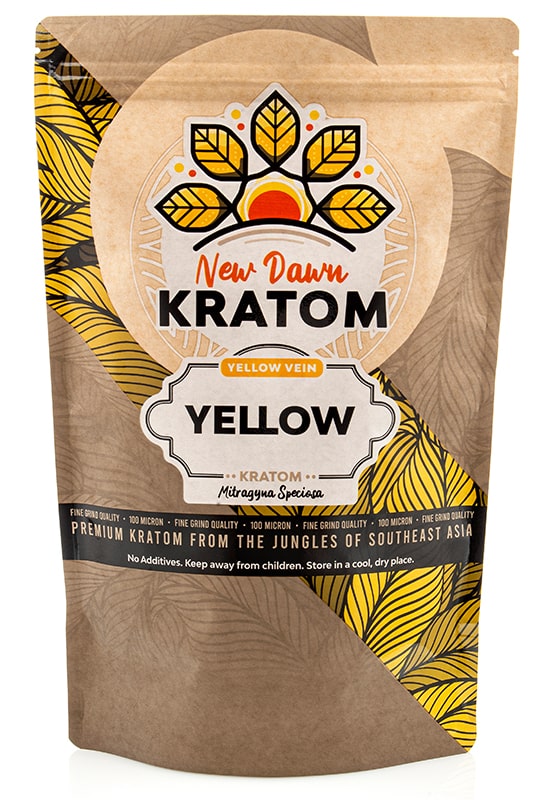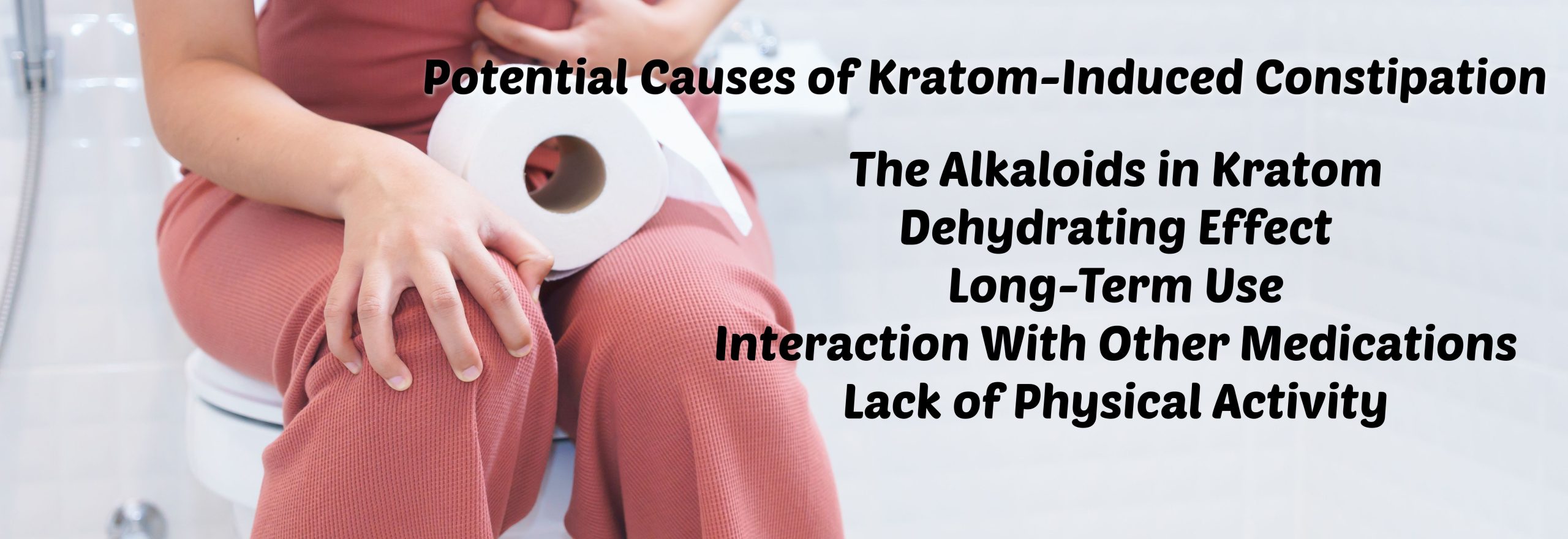Kratom is an evergreen tree that originated from Southeast Asia and has gained widespread popularity in the west, thanks to its numerous benefits. Unfortunately, it also presents negative effects, with constipation ranking among the most commonly reported side effects.
Below, we will evaluate the relationship between kratom and constipation, what causes it, and provide a few possible remedies for it.
Does Kratom Make You Constipated?
Some kratom users report that they experience constipation after indulging in the herbal supplement. The reason behind this is pretty straightforward. Kratom has a lot of physiological effects on the body, particularly on the digestive tract.
The active alkaloids in kratom have a dehydrating effect on the body. They also slow down the movement of food along the digestive tract. As a result, some users report experiencing gastrointestinal side effects, including constipation, upset stomach, nausea, and even diarrhea.
It is important to note that kratom affects people differently, and these actions may not occur concurrently. However, users have observed the same effect: constipation.
Besides the discomfort the user feels, constipation caused by kratom may have long-term debilitating effects like bowel obstruction and swollen rectal veins.

Prevalence of Constipation From Kratom Use
Despite the overwhelming fear peddled all over the internet over kratom-induced constipation, it doesn’t really affect many people, at least not regularly. According to a recent study, 94% of kratom users have never experienced constipation after taking the herb. This means that only 6% of kratom users develop constipation as a side effect.
Potential Causes of Kratom-Induced Constipation
If you’re suffering from constipation caused by kratom, it may help to know what causes it so you can take preventive measures and ultimately improve your kratom experience. Here are some possible causes of kratom-induced constipation.
The Alkaloids in Kratom
The active compounds in kratom, mitragynine and 7-hydroxymitragynine have an inhibiting effect on intestinal transit.
Essentially, these alkaloids bind to certain receptors, which then affect the muscles in the intestinal wall. This slows down the movement of food, thus increasing the travel time of ingested food through the gut.
Dehydrating Effect
Kratom is a colonic stimulant. When ingested, it has a dehydrating effect on the body. This causes a reflex action within the digestive tract that prompts the body to absorb water from fecal matter. The result is a hard stool, which may cause constipation.
Long-Term Use
When you take kratom for too long, it may alter the function of your gastrointestinal tract. With time, the constant implications on the digestive tract and gut bacteria compound themselves into more serious issues, paving the way for chronic constipation.
Lack of Physical Activity
When you use kratom without physical activity, its action in the gastrointestinal tract becomes more pronounced. The intestinal tract may become sluggish and its muscles weakened, thus slowing down bowel movements and leading to constipation.
How to Prevent Kratom-Induced Constipation
Kratom constipation can be very uncomfortable. Fortunately, there are tons of things you can do to decrease your possibility of getting constipated after taking kratom. For maximum results, you first need to figure out why kratom makes you constipated in the first place, then find a workaround.
Here are a few ways to prevent or relieve constipation induced by kratom.
Stay Hydrated
Most users take their kratom in the form of kratom tea, while others like taking their kratom in a more subtle form, like in capsules. Regardless of your kratom consumption method, make sure you take it with water.
But since kratom already has a dehydrating effect, one glass of water may not do much for your body. Therefore, to counter kratom’s dehydrating effects, you need to take a lot of water, preferably not less than eight glasses a day.
Eat a High-Fiber Diet
Fiber is the indigestible part of plant-based foods, such as fruits, vegetables, whole grains, and legumes. Eating a diet high in fiber is not only rich in healthy nutrients but can also help prevent kratom constipation by adding bulk to the stools and promoting regular bowel movements.
Fiber also absorbs water as it moves through the digestive system, making the stool soft and moist. This is especially true for the soluble fiber found in fruits and vegetables, which absorbs water and forms a gel-like substance.
The result is a longer digestive process and a nature-broom-effect, which helps waste move along the digestive tract.
Exercise Regularly
Exercise increases bowel movement by stimulating the muscles in the intestinal tract. This helps move food and waste through the digestive system more quickly.
Exercise also helps regulate the hormones that control digestion, which can keep the bowels moving smoothly and efficiently.
Take a Fiber Supplement
Taking a fiber supplement works pretty much the same as taking regular diet-based fiber. If you are unable to increase your fiber intake through dietary means, you can purchase fiber supplements.
These supplements will increase the stool bulk and help food move along faster in the digestive tract.
Avoid Taking Kratom on an Empty Stomach
Your stomach contents, both food and fluid, help to process kratom after ingestion. Taking kratom on an empty stomach increases your chances of getting dehydrated, which may cause constipation.
Therefore, it is advisable to eat a small meal or a snack before you consume kratom. This way, you provide your body with the necessary fluids to process kratom.
Use a Lower Dose of Kratom
Kratom doesn’t have a lot of side effects at lower doses because the number of alkaloids absorbed by the body at lower doses isn’t enough to cause adverse reactions.
Therefore, it is safe to conclude that the amount of kratom you take has significant implications on your bowel movements and the possibility of developing constipation.
Try Switching to a Different Strain of Kratom
Different kratom strains can have different effects on the body, and some strains may be less likely to cause constipation than others.
For instance, red vein varieties, known for their sedating effects, are more likely to cause constipation.
In contrast, white and green vein varieties, which typically have more energizing effects, are less likely to cause constipation.
Frequently Asked Questions
How long does kratom-induced constipation usually last?
The duration of constipation induced by kratom varies greatly depending on your tolerance, dosage, and kratom strain ingested.
In most cases, kratom constipation issues lasts for only a few hours. But some people get it for a few days or even weeks. When you notice less frequent bowel movements leading to constipation, it is advisable to consult a doctor.
Can long-term kratom use lead to chronic constipation?
Yes, constipation is one of the side effects of kratom consumption. Therefore, long-term, frequent use can exacerbate these side effects, leading to constipation.
Should I talk to my doctor before taking kratom if I have a history of
constipation?
It is always advisable to consult a doctor before using any herbal supplement.
Your doctor may suggest the best dosage and viable preventive measures to keep you from getting constipation.
Can kratom-induced constipation be a sign of an overdose?
Despite being a side-effect of kratom, constipation is not a sign of kratom overdose. A kratom overdose is mainly characterized by severe side effects, such as nausea, vomiting, drowsiness, and confusion.

Are there any natural remedies to relieve kratom-induced constipation?
Several remedies to relieve constipation include the following:
- Adequate hydration
- Eating high-fiber foods
- Probiotic supplements
- Certain herbs like psyllium
- Regular exercise
Is there a difference in the likelihood of constipation between different
forms of kratom (i.e., powder, capsules, extract)?
The likelihood of getting kratom-induced constipation may vary depending on the form of kratom used. For instance, kratom powder has a higher possibility of causing constipation since it’s harder to digest.
Concentrated forms of kratom, like extracts, may also have a higher chance of causing constipation due to the abundance of alkaloids.
Can kratom-induced constipation be avoided by cycling kratom use?
Yes, you can avoid constipation with regular kratom breaks, which help the body recover and flush out any kratom that may be causing constipation.
It also reduces your tolerance, thus reducing the amount of kratom you need to get desired effects.
Conclusion
Constipation can take the fun out of your kratom experience. Fortunately, you can overcome kratom-induced constipation by staying hydrated, exercising, eating dietary fibers, and switching up your strains.


